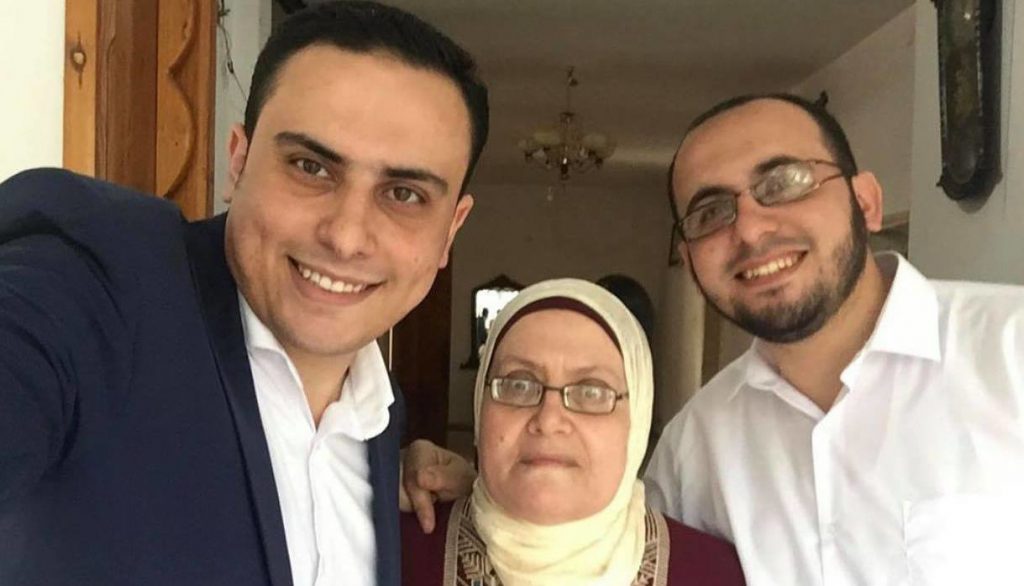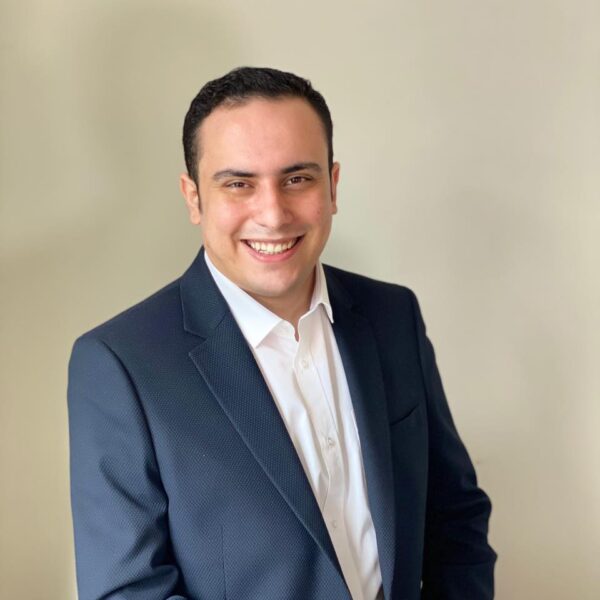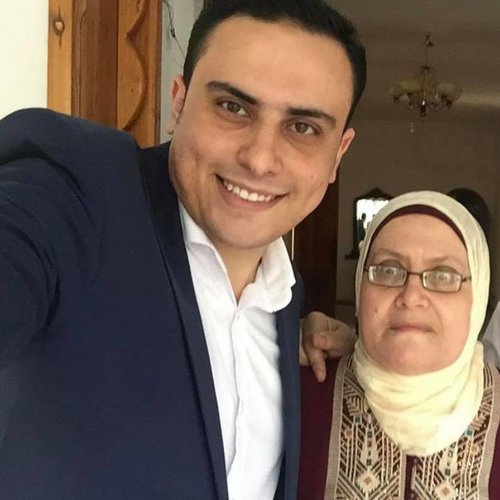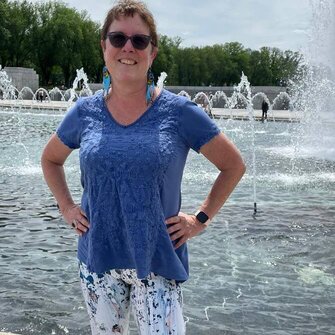
At 5 p.m. April 21, my mother, Basema, died at the age of 62. That moment in time will be seared into my brain and heart for the rest of my life. Closure has been especially difficult because I am thousands of miles away from my family. Writing this tribute is my way of being “present” with my family–and with her.
Basema Alnaouq suffered from cancer for the past two years. Her treatment journey can be described with two words: trauma and suffering.
She already had struggled with severe depression for past 20 years, so when she was first diagnosed with breast cancer and was prescribed chemotherapy*, it was harder than for most. Mom experienced hair loss, fatigue, lack of appetite and an exacerbation of her depression. After five months, she couldn’t take it any longer and asked the doctors to stop, whatever the consequences. Fortunately, testing seemed to indicate the cancer was in remission, so they didn’t put up a fight. The chemo was stopped. What a relief for us all!
Unfortunately, her wellbeing didn’t last long. The cancer reappeared three months later, this time in her spine and hips. It was then that her real torment began.
The hospital treating my mom wasn’t equipped to treat severe cases like my mom’s. Thus, a medical referral to a Jerusalem hospital was required. Although Jerusalem is only 70 kilometers away, obtaining the permissions required was extremely difficult: First, we needed the Palestinian Authority and the Jerusalem hospital to agree to accept and pay for her admission. Then we needed the Israeli government to allow her to travel, including transport by ambulance. With every step, hundreds of calls were required and many stops and starts.
After months of persistence and nagging, we finally managed to get her to Augusta Victoria Hospital in Jerusalem. What they told us was terrifying, but not surprising: We should have brought her in much earlier, they said. Her disease was now very advanced. However, they promised to do their best to ese the agonizing pain in her back. She was prescribed an escalating series of painkillers, and still they couldn’t kill the pain. With every passing day, the tumor spread and we could only watch her suffer. She returned about four times to Jerusalem for her biological therapy, and on every trip, we saw my mother’s strength fade and her ability to tolerate the pain lessen. Finally, she lost the ability to move and even talk.
Since the fall, I have been in the UK, studying for my master’s degree on a scholarship—hoping with all of my being that she would live until I return later his year. But she slipped into a coma, and on the 21st of April, my sister was sitting next to our mother in the hospital when she wrote in our family Facebook group, “Our mother is gone!” And my mind went blank.
***
During Ramadan 2010, I met with a young, injured man in my town, Dair Albalah in Gaza. Hossam, then 20, was only 19 when an Israeli F16 targeted a government building in the beginning minutes of Operation Cast Lead—the first of Israel’s wars against us, which launched in December 2008. This building was located next to UNRWA’s Community Training College, in which Hossam studied commerce.
“When I first got hit, scenes from my life passed through my head,” he told me. “I saw my past flash by in minutes, and I knew I was dying.” Many people who have been close to death have told me scenes from their life flashed through their head. The same happened to me when I read those words from my sister. A part of me died too; she is so much a part of who I am today. Here are some of the memories that visited me in that moment.
Flash
About a month ago, when the COVID-19 lockdown started in Leeds where I live, my sister called and told me the doctors said there is no hope and that we would lose her very soon. My sister asked me to return so I could see my mother one more time. But that wasn’t possible, due to the growing bans on travel and acceptance of visitors. At that time, my fellow students were leaving for home to shelter during the nationwide shutdown. With every passing day, I said goodbye to one or more of my colleagues, flatmates or friends. I envied everyone capable of returning home. After yearning for so long to escape the blockade of Gaza, my only wish now was to abandon the UK and return to Gaza and be with my mother. I wanted to scream to everyone able to travel that I needed this more than them.
Flash
My mother video-called me a few days before my sister asked me to return. When she saw my face on the phone screen, she kissed it repeatedly and said, “I want to see you before I die, Ahmed… I miss you, Ahmed!” she cried. I hid my tears and told her she will be fine. “You are not gonna die, Mom,” I replied. “You will be fine… and I will bring you here to attend my graduation ceremony in Leeds.” She was sure this would not happen. “I wish, Ahmed… I wish,” she sighed. She told me she was following the UK coronavirus outbreak and begged me not to go outside my home. I promised her I wouldn’t. I never thought this would be the last time I talked to her, ever.
Flash
Two years ago, I seized a rare opportunity and escaped to Egypt for a break. I secured a residency permit that turned out to be forged, and I found myself in prison. During my first night in solitary confinement, my mom consumed my thoughts. I remembered saying goodbye to her before I travelled, and how she begged me not to leave. Yet, I did. During my stay in Egypt, she’d call me every day for two hours, telling me about the insignificant events of her day. I enjoyed listening.
From the darkness of my prison cell, I took an oath not to travel again if I was released. I spent a month there, and I was not allowed to call. After 15 days of solitary confinement, I was taken to another prison, and on my way, I begged one of the police officers to let me call her. He refused at first but couldn’t resist the 600 pounds I offered him as a bribe. I called her and I lied about the reason for my absence. I told her I had found a job and was sent to a very remote area in Egypt where there was no internet connection. She believed me… and was reassured. I couldn’t hold back my tears and lied again, telling her my friend wanted his phone back. I missed her so much.
Flash
It was the best day of my life when I was released from prison and sent back to Gaza. I had been gone for seven months. The moment I entered Gaza, I found my father and brothers waiting to receive me. I was in a terrible shape, with long hair, unshaved beard and rotten clothes. I told my brother I wanted to go to my friend’s house, take a shower and shave before I met my mother. I didn’t want her to see me this way. My father replied, “Your mother can’t wait another minute to see you. She knew you were in prison.” I headed directly home. She was waiting at the door, so well dressed. Once she spotted me, she ran to hug me. She hugged me like she had never hugged anyone in the world and cried, “I missed you, Ahmed!” She had cleaned my room, cooked my favorite food, prepared my bath and invited my married sisters over. She missed me! And I missed her.
Flash
I graduated from university in 2016. The ceremony was boring and long. Mom attended, but waited until the party was over, then kissed me and gave me my present. “I want to attend your wedding party now, Ahmed!” she said. Ever since, she saved every penny she had for my anticipated wedding. She never bought herself a dress, a pair of shoes or a scarf. She asked m, again and again to allow her to propose to any girl I wanted. And I refused. I regret so much that she died before I could grant her that wish.
I think of my nicknames for her. I used to call her “my Soso, Soma and Somsom” (common endearments for children). I didn’t like to call her mom like others do. I remembered every time I returned from work and saw her in the kitchen cooking me food. Before she could notice me, I would tell her in English “I love you, Mama. Do you love me as I do?” She would reply, “You can never love me like I do. I am a mother. You are a piece of my heart. You are my blood and flesh.” “I think I love you more, Soso,” I replied. She would sigh and say, “I wish!”
Now I have lost her forever. She left before I could kiss her goodbye. She died thousands of miles away from me and I miss her more than anyone can imagine.
* In Gaza, chemotherapy is the first line of treatment rather than mastectomy. I do not know why.











